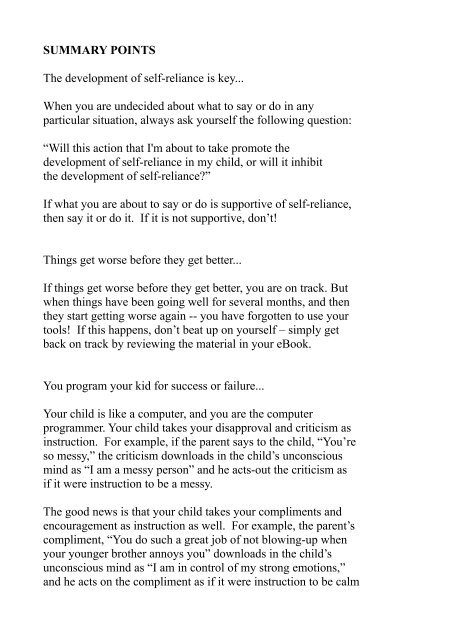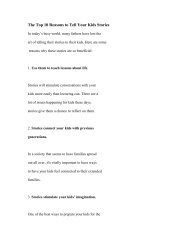SUMMARY POINTS The development of self-reliance is key... When ...
SUMMARY POINTS The development of self-reliance is key... When ...
SUMMARY POINTS The development of self-reliance is key... When ...
- No tags were found...
You also want an ePaper? Increase the reach of your titles
YUMPU automatically turns print PDFs into web optimized ePapers that Google loves.
<strong>SUMMARY</strong> <strong>POINTS</strong><strong>The</strong> <strong>development</strong> <strong>of</strong> <strong>self</strong>-<strong>reliance</strong> <strong>is</strong> <strong>key</strong>...<strong>When</strong> you are undecided about what to say or do in anyparticular situation, always ask your<strong>self</strong> the following question:“Will th<strong>is</strong> action that I'm about to take promote the<strong>development</strong> <strong>of</strong> <strong>self</strong>-<strong>reliance</strong> in my child, or will it inhibitthe <strong>development</strong> <strong>of</strong> <strong>self</strong>-<strong>reliance</strong>?”If what you are about to say or do <strong>is</strong> supportive <strong>of</strong> <strong>self</strong>-<strong>reliance</strong>,then say it or do it. If it <strong>is</strong> not supportive, don’t!Things get worse before they get better...If things get worse before they get better, you are on track. Butwhen things have been going well for several months, and thenthey start getting worse again -- you have forgotten to use yourtools! If th<strong>is</strong> happens, don’t beat up on your<strong>self</strong> – simply getback on track by reviewing the material in your eBook.You program your kid for success or failure...Your child <strong>is</strong> like a computer, and you are the computerprogrammer. Your child takes your d<strong>is</strong>approval and critic<strong>is</strong>m asinstruction. For example, if the parent says to the child, “You’reso messy,” the critic<strong>is</strong>m downloads in the child’s unconsciousmind as “I am a messy person” and he acts-out the critic<strong>is</strong>m asif it were instruction to be a messy.<strong>The</strong> good news <strong>is</strong> that your child takes your compliments andencouragement as instruction as well. For example, the parent’scompliment, “You do such a great job <strong>of</strong> not blowing-up whenyour younger brother annoys you” downloads in the child’sunconscious mind as “I am in control <strong>of</strong> my strong emotions,”and he acts on the compliment as if it were instruction to be calm
even we he <strong>is</strong> annoyed.Other things to consider:1. After <strong>is</strong>suing a consequence, never retract it.2. Allow your out-<strong>of</strong>-control kid to make wrong choices – th<strong>is</strong>gives him w<strong>is</strong>dom; experience <strong>is</strong> a great teacher.3. Be able to differentiate between your kid’s wants and herneeds.4. Consider having only one telev<strong>is</strong>ion and one computer in thehouse.5. Don’t nag – simply follow through with the consequence.6. Don’t try to save your kid from negative consequences andpainful emotions associated with poor choices.7. Expect your out-<strong>of</strong>-control kid to res<strong>is</strong>t your new parentingstrategies.8. Give equal love to all your kids, but parent them differently.9. Give only one warning -- then follow through with theconsequence.10. Give your kid at least five chores to do each week.11. If you have tried to correct your parent’s m<strong>is</strong>takes byattempting to be a “better” parent, know that (a) you turnedout all right, and (b) you may be erring on the other end <strong>of</strong> theextreme (e.g., your parent was aggressive to you as a child, soyou decide to parent in a passive, over-indulgent way).12. If you slip into a rage against your kid, apologize - but don’ttry to compensate by over-indulging him.
13. If your kid hibernates in h<strong>is</strong> bedroom, take that telev<strong>is</strong>ionand computer out <strong>of</strong> there.14. Keep an eye out for your kid’s guilt-trips.15. Know that a weaker parenting-strategy supported by bothparents – even if they are divorced -- <strong>is</strong> better than a strongerstrategy supported by only one.16. Learn to say -- and stick with -- “no.”17. Only give your kid gifts on very special occasions (e.g.,birthdays, Chr<strong>is</strong>tmas, graduation).18. Pay attention to your feelings <strong>of</strong> guilt about how you haveparented, and know it <strong>is</strong> a sign that you are – once again –beating up on your<strong>self</strong>.19. Remember that over-indulged kids are too comfortable –they need some d<strong>is</strong>comfort before they will change.20. Remember that parenting <strong>is</strong> not a popularity contest –you are not a "buddy"!21. Respond to your kid’s anger with a poker face.22. <strong>When</strong> taking away privileges, take away the privilege for ashort period (3 days works best). If it lasts too long, resentmentbuilds, the kid forgets the infraction, and the lesson <strong>is</strong> lost.23. <strong>When</strong> you catch your<strong>self</strong> feeling sorry for your kid, knowit <strong>is</strong> a sign that you are – once again – taking on too muchresponsibility.24. <strong>When</strong> your kid needs to be cheered-up, do so with activel<strong>is</strong>tening, empathy, paraphrasing, validation, and hugs ratherthan giving her a lot <strong>of</strong> stuff and freedom (e.g., unearnedprivileges, food, gifts, fun activities).
25. Don't dabble with these non-traditional parentingstrategies. Be cons<strong>is</strong>tent and you will out-will the strong-willed,out-<strong>of</strong>-control kid!







